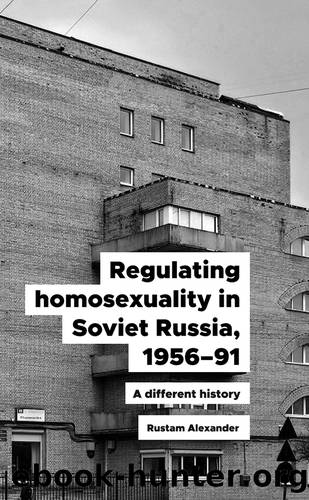Regulating Homosexuality in Soviet Russia, 1956-91: A Different History by Rustam Alexander

Author:Rustam Alexander [Rustam Alexander]
Language: eng
Format: epub
ISBN: 9781526155764
Google: Mh4CzgEACAAJ
Publisher: ManchesterUP
Published: 2021-09-15T20:45:55+00:00
4
Soviet legal and criminological debates on the decriminalisation of homosexuality (1959â75)
Those few historians who have attempted to write the history of Soviet sexuality concur that, from the 1930s through to the Soviet collapse, Soviet society and especially the Soviet state were deeply hostile to anything that deviated from âtraditionalâ sex in the bedroom.1 Sex was generally deemed a topic unfit for public discussion, and any deviations from ânormalâ sexuality were condemned and criminalised by Soviet law.2 And yet, despite these long-standing and institutionalised prudish attitudes towards sex and hostility towards homosexuality, during the late Soviet period a group of legal scholars spoke out in favour of decriminalising consensual sodomy. This is in sharp contrast to the conventional view of the Brezhnev period as a time of stagnation and sexual conservatism and offers a window onto a very different dimension of that period â and yet we know very little about it. The fact that these debates took place has been noted by pioneering scholars of Soviet sexuality Igor Kon and, more recently, Dan Healey, yet neither has discussed them in much detail.3
The emerging scholarship on the Brezhnev era offers a more nuanced account of this period, challenging its characterisation as a time of mere stagnation. Mark Sandle has argued that although scholars customarily view the Brezhnev years as âan era dominated by the orthodox platitudes of the official ideologyâ, intellectual life during this time was characterised by âstruggle, conflict and creativityâ.4 More recent studies have also emphasised that the Brezhnev era was accompanied by âthe liberalisation of social, economic, and political lifeâ and âa dialogue among different socialist publics as well as state authoritiesâ.5 This chapter will add to this perspective, showing that similar trends were evident among legal scholars who discussed and challenged the criminal status of homosexuality in their manuals, textbooks and dissertations on sex crimes in the period from 1959 to 1975.
Proponents of decriminalisation of consensual sodomy based their arguments on the nascent expertise of Soviet sexology, positing that the regulation of same-sex desire should be assigned to the realm of medicine rather than law. Some of these scholars went so far as to argue that homosexuality was not a medical issue at all, but a natural variant of human sexuality and hence did not require medical intervention. These arguments invited sharp criticism from conservative scholars, who asserted that homosexuality violated socialist morality and therefore should be punishable by law (some of them even insisted on criminalising lesbianism). In this chapter I will argue that the positions of these two groups of scholars regarding the anti-sodomy statute and criminal status of lesbianism were becoming more pronounced and elaborate under Brezhnev. While proponents of criminalising homosexuality demonstrated increasing hostility towards the idea of relegating the issue of same sex to medicine, strongly opposing any push for decriminalisation, their opponents fiercely argued the opposite, denying that consensual sodomy was a threat to Soviet society.
By examining the debates over the criminal status of homosexuality from the late 1950s up to
Download
This site does not store any files on its server. We only index and link to content provided by other sites. Please contact the content providers to delete copyright contents if any and email us, we'll remove relevant links or contents immediately.
Sex Workers As Virtual Boyfriends by Joseph Itiel(216)
A Trans Man Walks Into a Gay Bar: A Journey of Self (And Sexual) Discovery by Harry Nicholas(195)
Despite All Adversities by Lema-Hincapié Andrés;Castillo Debra A.;(187)
A History of Women in Men's Clothes by Norena Shopland;(179)
Transgender Behind Prison Walls by Baker Sarah Jane Stockwell Pam(178)
One Marriage Under God by Melanie Heath(169)
Transgender Employees in the Workplace by Jennie Kermode(168)
Visions of Sodom by H. G. Cocks(163)
Substance Use Disorders in Lesbian, Gay, Bisexual, and Transgender Clients by Sandra Anderson(161)
Queer TV China by Zhao Jamie J.;(158)
Consumed by Desire (Central Park South Book 1) by Bianca Vix(156)
Confronting Religious Denial of Gay Marriage by Wallace Catherine M.;(156)
Lesbian Doms: 10 Women Describe Their Most Memorable Lesbian Domination Experience by Foster Kendra(156)
Who's Who in Contemporary Gay and Lesbian History Vol.2 by Robert Aldrich Garry Wotherspoon(150)
Lesbian Mothers by Ellen Lewin(147)
She and Her Pretty Friend by Danielle Scrimshaw(143)
Mobile Orientations by Nicola Mai(142)
My White Best Friend by Rachel De-lahay(140)
A Practical Guide to Searching LGBTQIA Historical Records by Norena Shopland(138)
